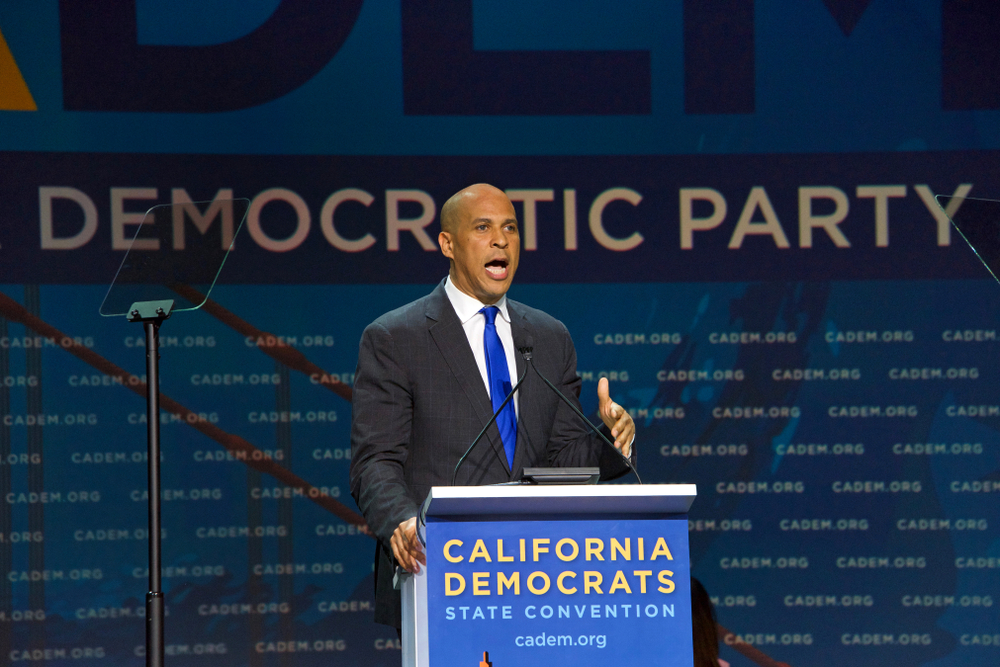In an era of political polarization and growing voter disenchantment, Senator Cory Booker of New Jersey has taken extraordinary measures to galvanize Democratic opposition to the Trump administration. His recent 25-hour continuous address on the Senate floor marks not just a personal milestone but potentially a turning point for a party struggling to find its voice.
The marathon protest
The New Jersey senator’s decision to speak for 25 consecutive hours without breaks for food, water or restroom visits represented more than just physical endurance. Dubbing his protest “Good Trouble” — an homage to civil rights leader and late U.S. Rep. John Lewis — Booker positioned his marathon speech as a direct response to constituent demands for more forceful resistance from Democratic lawmakers.
The timing could hardly be more critical. Recent polling data from Harvard CAPS Harris shows Democratic Party approval ratings hovering at just 37 percent, among the lowest recorded in years. More concerning for party leadership, 71 percent of voters surveyed expressed desire for new direction within the party.
Booker’s prolonged protest serves both practical and symbolic purposes. By commanding the Senate floor for more than a day, he forced attention to Democratic priorities while demonstrating a willingness to sacrifice personal comfort for political principle — a quality increasingly demanded by the party’s disaffected base.
Historical echoes and contemporary relevance
The symbolic power of Booker’s protest extends beyond current politics. His 25-hour speech deliberately surpassed the previous record for continuous Senate floor remarks — a 24-hour filibuster by South Carolina Senator Strom Thurmond against the Civil Rights Act of 1957.
This historical parallel adds profound significance to Booker’s action. As an African American senator standing longer than Thurmond once stood to block civil rights legislation, Booker embodied the progress America has made while simultaneously highlighting the continuing struggle against regressive policies.
Throughout his address, Booker emphasized the collective power of ordinary citizens over entrenched political interests. This message resonates particularly within marginalized communities increasingly concerned about the direction of federal policy under the current administration.
Revitalizing Democratic opposition
Booker’s demonstration has catalyzed renewed energy among Democratic lawmakers previously criticized for tepid opposition to Trump administration policies. His marathon speech appears to have broken a dam of restraint, with other Democratic representatives finding bolder voices.
Representative Jasmine Crockett of Texas exemplifies this emerging spirit of confrontation. Known for direct challenges to powerful figures including Elon Musk, Crockett represents a new generation of Democratic lawmakers unencumbered by traditional political decorum when addressing what they view as fundamental threats to democracy.
This shift in Democratic tactics comes amid widespread grassroots activism. On April 5, thousands participated in coordinated anti-Trump demonstrations worldwide, suggesting Booker’s Senate floor marathon connects to broader public sentiment beyond Washington’s political circles.
Accountability within activism
While Booker’s protest has energized much of the Democratic base, it has also intensified scrutiny of his legislative record and political associations. Progressive activists have highlighted perceived inconsistencies between his impassioned rhetoric and certain voting patterns, particularly regarding foreign policy.
His continued acceptance of funding from organizations like the American Israel Public Affairs Committee has drawn criticism from some progressives who demand greater alignment between Democratic lawmakers’ public statements and their financial relationships.
This internal critique reflects broader tensions within the Democratic coalition between pragmatic political considerations and ideological consistency. As the party attempts to present a unified front against the Trump administration, these debates about accountability and authentic representation continue beneath the surface.
The path forward
The ultimate impact of Booker’s marathon speech will depend on whether it represents a momentary spectacle or the beginning of sustained, coordinated Democratic resistance. Party leadership now faces the challenge of channeling this renewed energy into coherent political strategy and substantive policy alternatives.
For Democratic voters who have expressed frustration with perceived passivity from their elected representatives, Booker’s action provides a template for the kind of determined opposition they expect. Whether other Democratic senators and representatives will follow his example remains to be seen.
What appears certain is that business as usual no longer satisfies a Democratic base increasingly impatient with traditional political calculations. As public demonstrations grow and approval ratings decline, Democratic officials face increasing pressure to match their constituents’ sense of urgency.
Beyond congressional walls
While Booker’s Senate floor demonstration commanded Washington’s attention, equally significant political action continues outside government buildings. The April 5 protests represented just one manifestation of growing grassroots mobilization against the current administration.
Community organizers across America report unprecedented levels of local engagement, from record attendance at town halls to overflowing volunteer rosters for voter registration drives. This groundswell suggests Booker’s marathon speech reflects rather than creates momentum already building within the Democratic base.
For a party facing historically low approval ratings, this organic activism provides critical resources beyond what official party structures can generate. The challenge for Democratic leadership lies in authentically connecting with this energy without attempting to control or dilute its fundamental demands.
A defining moment
The significance of Senator Booker’s 25-hour protest extends beyond its immediate political context. In demonstrating physical and moral resolve, he has provided a reference point for what determined opposition can look like in an era when democratic norms face unprecedented challenges.
Whether this moment becomes a turning point for Democratic resistance or merely a footnote in political history depends largely on what follows. The extraordinary nature of Booker’s action demands equally extraordinary follow-through, not just from him but from Democratic leaders across government.
As America approaches another contentious election cycle, the party’s ability to translate momentary inspiration into sustained momentum may determine not just its electoral fortunes but its relevance to a citizenry increasingly skeptical of established political institutions. Booker’s marathon speech has raised the bar for what constituents expect from those who claim to represent their interests.














